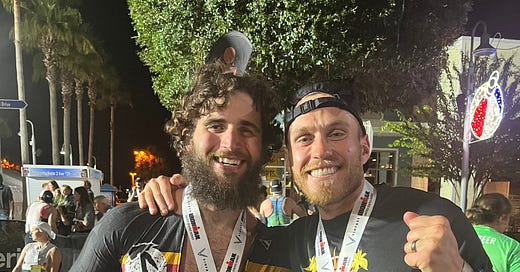What Does My Endurance Coaching Business *actually* Do For People?
Questions on Ironman coaching, programming and mindset
Today’s write up is inspired by these tweets from Zach Pogrob and Danny Miranda.
Over the past month, I’ve been digging for clarity on 2 things:
what my coaching service offers (aside from training plans)
what problems I help people solve (aside from crossing finish lines)
I’ve been coaching endurance for nearly 2 years and still struggle saying exactly what I do.
Here were a few of my early ideas:
I help people get into endurance.I give them an exercise plan for their goals.I guide them to build confidence through training.But it still felt like I was missing major pieces of what I do…
What internal change is happening in my athletes?
How is their life getting better through our work together?
I know I’m improving their mindset and lifestyle… but how? What are the specifics?
Then it hit me….
Just ask them.
I did. And here’s what two of them said.
2 Ways My Athletes Build Stronger Mindsets
Improving Consistency By Changing Perspectives On Success
Dylan Spina came into endurance training thinking that consistency meant sticking to the plan 100% of the time.
Well… life is unpredictable, shit happens and workouts don’t go as planned.
Early in Ironman training, Spina went out for a ride, crashed multiple times and didn’t ride for as long as the workout was supposed to be.
His first reaction was seeing the session as a failure (he’s a Marine and committed to following orders to a T).
I helped him take another look at the situation.
He won the day by showing up for his ride.
He could stay consistent toward his goal of becoming an Ironman by resting up and getting his body back to 100%.
A huge perk of endurance is the enormous variety of ways to make progress.
We can be consistent with our nutrition, hydration, sleep, recovery.
We can be consistent in the words we choose and how we speak to ourselves.
The workouts I program are like one piece of a hundred piece puzzle my athletes are trying to put together.
Spina’s perspective on consistency shifted from completion to effort.
We become an Ironman by consistently putting in effort over an 8 month to 1 year timeline.
And that’s exactly what Spina did. He rested up and got back on the bike the very next day.
The rep doesn’t matter as much as the fact that we are putting in reps!
A few months later…
Helping Them See Wins When They Think They’ve Failed
Keith Marquis has shown up to swim at 5 am three times within the past month and arrived to a closed pool.
His small town gym is short on lifeguards and if one doesn’t show up to work, no one can swim.
The first time this happened, Keith was (naturally) quite frustrated.
He got out of bed in the 4 o’clock hour, made the effort to get his training session in and was blocked by something outside of his control.
His first reaction was to see the morning as a loss and suggested he could make up the swim later in the week.
I had a different perspective.
I guided Keith to see that he did his part. He made the effort. He won.
He showed up and stacked a valuable brick as he’s building the identity of an Ironman.
Just because the training session didn’t get done, doesn’t mean the effort was wasted.
It’s easy to say focus on what’s in your control, but without these circumstances, the lessons don’t hit home.
The second and third time this happened, Keith just rolled with it and lifted instead.
Instead of being bogged down by a closed pool and carrying the baggage of perceived failure with him for the rest of the day, he chose a different path.
He got stronger in the gym, showed up confident and accomplished to work and was present and stable for his wife and kids in the evening.
You know what’s more important than a single swim session on the path to becoming an Ironman?
Staying positive, maintaining momentum and uncovering small wins that help you see the real progress you’re making as a human being.
Internal Identity > External Reality
There’s one throughline in these two stories: not being married to the outcome
My athletes don’t become Ironman finishers in November by nailing a workout in March or April.
They become Ironman finishers by showing up in March, April, May, June, July.. all the way through November.
And along the way, I help them see consistency as something different than perfection and show them how they’re winning even when life feels like an L.
You can do an Ironman or you can become an Ironman.
I make sure my athletes are the latter.





